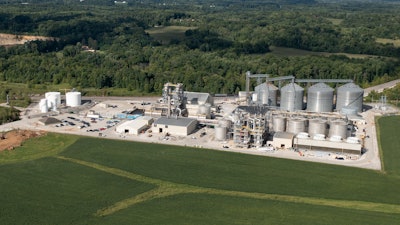
POEThasreopened its bioprocessing facilityin Cloverdale, Indiana, with an event at the facility that included area farmers, community members and state officials.
POET has invested $30 million in new technology and upgrades to bring the facility up to the company’s optimal standards and increase its annual production rate from 80 million to 95 million gallons of bioethanol. POET – Cloverdale will also create 50 fulltime local jobs and generate demand for 34 million bushels of Indiana corn annually.
The reopening program featured remarks from Gov. Eric Holcomb, Lt. Gov. Suzanne Crouch, and U.S. Rep. Jim Baird (IN-04), as well as POET executive leadership.
“As a global leader in the research, development, and production of low-carbon biofuels and bioproducts, POET is proud to work with more than 40,000 American farmers as we harness the power of agriculture to create a more sustainable world,” saidJeff Broin, POET founder and CEO.
“The addition of our 34th bioprocessing facility displays our commitment to growing the bioeconomy, and it is with immense pride in our team and gratitude to the surrounding community and the state of Indiana that we reopen POET Bioprocessing – Cloverdale.”
 POET general manager Jeremy Jacobs cuts the ribbon at the Cloverdale reopening.
Courtesy of POET.
POET general manager Jeremy Jacobs cuts the ribbon at the Cloverdale reopening.
Courtesy of POET.
Since then, better federal management of the RFS and support for E15 (a 15% bioethanol blend) at the state level from key Indiana policymakers, including Gov. Holcomb, Lt. Gov. Crouch, and Rep. Baird, have played a significant role in POET’s decision to reopen Cloverdale, its fifth facility in the state.
“With agriculture being one of the core industries of Indiana’s economy, we are excited for POET – Cloverdale to open its doors and for the value the facility will bring to Hoosier farmers and rural communities,” said Lt. Gov. Crouch, Indiana’s Secretary of Agriculture and Rural Development. “The bioethanol industry supports growth in our local economies, expansion in grain markets, and enhances our communities and farm families.”





















